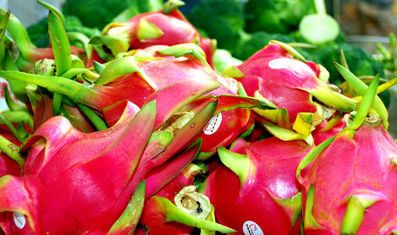
Fresh fruits are loaded with vitamins, minerals, fiber and phytochemicals and are necessary to keep an alkaline environment in the body. The first fruits in recorded history were olives, dates, figs and grapes.
Many early fruits were domesticated and today bear little resemblance to their wild cousins. Domesticated fruits are larger, sweeter and have less fiber than fruit from the past. For example, the Golden Delicious apple of today started out as a crab apple.
Fresh fruits are good for us in theory, but if you are overweight or insulin resistant like many Americans are, it is critical to limit sugary fruits such as bananas, grapes, mangos, apples, pears, kiwi, pineapples and sweet cherries.
Dr. Cordain, PH.D, and founder of the Paleo Movement suggests eating more vegetables in lieu of higher sugar fruits. Dried fruits are also a “no-no” as they contain a high a concentrated amount of sugar. Most dried fruits resemble commercial candy more than fruit.
However, fruit lovers need not dismay, there are a number of low sugar fruits that can be enjoyed as part of a healthy diet.
Lemons
Lemons, as well as other citrus fruits, provide a diverse and plentiful array of benefits to the body. Eating organic citrus fruits and drinking fresh-squeezed citrus juices can give your skin a healthy glow, boost your immune system, and, according to some studies, could even help fight a variety of cancers. Lemons contain just 2.5 grams of sugar per 100 grams.
One of the best known health properties of citrus fruits such as lemons is their high vitamin C content. Vitamin C is a powerful antioxidant, which aids the immune system in all of its disease-fighting functions. Lemons also contain flavonoids, which increase the potency of vitamin C, reduce bodily inflammation, improve circulation and help regulate blood pressure.
Although one would think that lemons promote acidity because of their sour taste, lemons actually alkalize the body, helping to balance your pH levels naturally. They also aid in the detoxification of the liver by stimulating natural liver enzymes, which helps keep your circulatory system, and your skin, clear. The electrolytes found in lemons help keep your body hydrated and functioning optimally.
Avocados
Avocados, known also as alligator pears, are the fruit of the Persea americana, a large evergreen tree. Avocados have a mere .9 grams of sugar per 100 grams. Depending on variety, they can weigh anywhere from 8 ounces to 3 pounds and are much more like a berry than a fruit.
While eaten as a vegetable, alligator pears are unlike any other vegetable; they contain enough healthy fat to pass as a meat substitute. Similar to coconuts, avocados are sometimes snubbed because of their high fat content.
One cup of avocado cubed contains about 240 calories and 22 grams of fat. But, don’t let this fat fact scare you. The fat found in avocados is comprised of oleic acid and is extremely healthy monounsaturated fat, the same kind found in olive oil.
According to the American Heart Association, monounsaturated fat can lower cholesterol and plays a role in keeping hair and skin healthy. Research done indicates that avocado fat reduces inflammation within the body and is especially useful for people suffering from arthritis.
The digestive tract also benefits from healthy fat and the transportation of fat soluble nutrients depends on it. There is also solid evidence to support the fact that avocados reduce heart disease.
Tomatoes
Tomatoes are an amazing and delicious anti-inflammatory fruit and contain only 2.8 grams of sugar per 100 grams. They can be eaten raw to receive the highest amount of nutrition, or steamed and added to your favorite meal. Tomatoes are fat free, which make them a way to fill up without filling up on a high calorie food. They are packed with vitamin C, which is essential for a healthy immune system.
Lycopene is a carotenoid present in red and orange tomatoes, and is responsible for these bright hues. Studies have linked lycopene to a reduced risk of vision loss due to macular degeneration, as well as a lower risk of some cancers, including skin, lung, breast, cervical and prostate. Lycopene may also lower the risk of coronary artery disease.
It is usually a standard recommendation to cook tomatoes in order to make lycopene more nutritionally available. This is because the lycopene in red tomatoes (trans-lycopene) is hard to absorb by the intestines. However, orange heirloom tomatoes contain a type of lycopene called prolycopene, which is two and a half times easier for the body to absorb.
Side Note: Tomatoes are also known as a nightshade. If you suffer from joint pain, morning stiffness, inflammation or are sensitive to weather changes, you may want to stay clear of this fruit.
Strawberries
Strawberries are high in vitamin C, which has noted immune system-boosting properties. They have just 5.8 grams of sugar per 100 grams but taste oh, so sweet when they are ripe. These pretty little fruits are also a good source of fiber, and contain calcium, magnesium and potassium. Some of their most important contributions to our bodies, however, are several types of phenolic antioxidants.
Phenolic antioxidants have been found by several studies to help reverse inflammation throughout the body, reduce your overall risk of chronic disease and help you lose weight naturally. The anti-inflammatory properties of strawberries aid the body in restoring balance to weight-regulating hormones.
Some of the phenolic antioxidants found in strawberries are known as anthocyanins, which are responsible for their bright red color. Anthocyanins increase your body’s production of the hormone adiponectin, which functions as a metabolic stimulant and appetite suppressant.
Anthocyanins have also been linked to a decreased risk of heart disease, as well as a lower risk of some cancers. They also help slow your rate of digestion of carbohydrates, which controls the spike in blood sugar that frequently occurs after a starchy meal. Ellagic acid, another antioxidant compound found in strawberries, also has these effects on blood sugar regulations.
Dragonfruit
Dragonfruit is as tasty as it is beautiful and has a sweet and crunchy flavor that falls somewhere between a kiwi and a pear. This exotic delight has only 60 calories per 100 grams. It is both filling and delicious with only 18 calories from fat, 8 from protein and 34 from carbohydrates. With 8 grams of sugar per 100 grams, this may seem more like a medium sugar fruit rather than a low sugar fruit, however, the carbohydrates are easily broken down by the body into a useable energy form which counterbalances any negative effect the sugar may have. Ironically, dragonfruit actually reduces blood sugar if eaten after a meal.
 Dragonfruit contains tiny black seeds that are rich in omega-3 and omega-6 fatty acids. Research indicates that these fatty acids can reduce triglycerides and decrease the risk of cardiovascular disorders. The fiber in this fruit will keep you regular, improve digestive health and help you manage your weight.
Dragonfruit contains tiny black seeds that are rich in omega-3 and omega-6 fatty acids. Research indicates that these fatty acids can reduce triglycerides and decrease the risk of cardiovascular disorders. The fiber in this fruit will keep you regular, improve digestive health and help you manage your weight.
If you consume dragonfruit on a regular basis, you will also benefit from its vitamin C, phosphorus, calcium and antioxidants. Rich in B1, B2 and B3, dragonfruit assists with carbohydrate metabolism, reduces bad cholesterol and promotes healthy skin. Minerals in dragonfruit support strong bones and teeth and the phosphorus in it is essential for tissue formation and healthy blood.
Dragonfruit contains phytoalbumins, which have powerful antioxidant properties that help prevent the formation of cancer cells and increase detoxification of heavy metals.
Lycopene gives this fruit its rich color, and according to the National Cancer Institute, may protect against certain cancers. Results from animal studies have shown that lycopene may have chemopreventive effects for prostate, breast, lung, liver and skin cancer.
Note: We strongly recommend you purchase local and organic or at least organic fruit when you can.
-The Alternative Daily
Sources:
http://diabeticlifediet.com/my_diabetic_diet_foods/dragon_fruit_pitaya_fruit/dragon_fruit_health_benefit/
http://www.wholeliving.com/133889/heirloom-tomatoes

